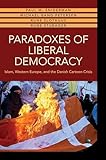Paradoxes of Liberal Democracy : Islam, Western Europe, and the Danish Cartoon Crisis / Michael Bang Petersen, Paul M. Sniderman, Rune Stubager, Rune Slothuus.
Material type: TextPublisher: Princeton, NJ : Princeton University Press, [2014]Copyright date: ©2014Edition: Pilot project. eBook available to selected US libraries onlyDescription: 1 online resource (200 p.)Content type:
TextPublisher: Princeton, NJ : Princeton University Press, [2014]Copyright date: ©2014Edition: Pilot project. eBook available to selected US libraries onlyDescription: 1 online resource (200 p.)Content type: - 9780691161105
- 9781400852673
- Caricatures and cartoons -- Political aspects -- Denmark
- Democracy -- Social aspects -- Denmark
- Freedom of speech -- Denmark
- Islam and state -- Denmark
- Religious pluralism -- Political aspects -- Denmark
- POLITICAL SCIENCE / Censorship
- Danish Muslims
- Danish newspapers
- Denmark
- Islam
- Islamic fundamentalists
- Jyllands-Posten
- Mohammed
- Muslim immigrants
- Muslims
- anti-immigrants
- anti-immigration
- cartoons
- categorization paradox
- centrists
- civil rights
- covenant paradox
- democratic citizenship
- discrimination
- equal treatment
- evaluative judgments
- freedom of expression
- group categorization
- immigrant minorities
- immigrants
- inclusive tolerance
- liberal democracy
- party systems
- political center
- political judgment
- prospective judgments
- retrospective judgments
- right-wing ideology
- tolerance
- toleration
- welfare state
- western Europe
- 306.209489 23
- JN7161 .S65 2017
- online - DeGruyter
- Issued also in print.
| Item type | Current library | Call number | URL | Status | Notes | Barcode | |
|---|---|---|---|---|---|---|---|
 eBook
eBook
|
Biblioteca "Angelicum" Pont. Univ. S.Tommaso d'Aquino Nuvola online | online - DeGruyter (Browse shelf(Opens below)) | Online access | Not for loan (Accesso limitato) | Accesso per gli utenti autorizzati / Access for authorized users | (dgr)9781400852673 |
Frontmatter -- Contents -- Illustrations -- Preface -- Chapter 1. Introduction -- Chapter 2. A Clash of Rights -- Chapter 3. The Covenant Paradox -- Chapter 4. Flash Point -- Chapter 5. The Concept of Inclusive Tolerance -- Chapter 6. The Democratic Impulse -- Appendix A: Timeline of the Cartoon Crisis -- Appendix B: Description of the Main Data Set -- Appendix C: Comparison of Respondents from the Height and Aftermath of the Crisis -- Appendix D: Scaling and Measurement of Core Variables -- References -- Index
restricted access online access with authorization star
http://purl.org/coar/access_right/c_16ec
In 2005, twelve cartoons mocking the prophet Mohammed appeared in the Danish newspaper Jyllands-Posten, igniting a political firestorm over demands by some Muslims that the claims of their religious faith take precedence over freedom of expression. Given the explosive reaction from Middle Eastern governments, Muslim clerics, and some Danish politicians, the stage was set for a backlash against Muslims in Denmark. But no such backlash occurred.Paradoxes of Liberal Democracy shows how the majority of ordinary Danish citizens provided a solid wall of support for the rights of their country's growing Muslim minority, drawing a sharp distinction between Muslim immigrants and Islamic fundamentalists and supporting the civil rights of Muslim immigrants as fully as those of fellow Danes-for example, Christian fundamentalists. Building on randomized experiments conducted as part of large, nationally representative opinion surveys, Paradoxes of Liberal Democracy also demonstrates how the moral covenant underpinning the welfare state simultaneously promotes equal treatment for some Muslim immigrants and opens the door to discrimination against others.Revealing the strength of Denmark's commitment to democratic values, Paradoxes of Liberal Democracy underlines the challenges of inclusion but offers hope to those seeking to reconcile the secular values of liberal democracy and the religious faith of Muslim immigrants in Europe.
Issued also in print.
Mode of access: Internet via World Wide Web.
In English.
Description based on online resource; title from PDF title page (publisher's Web site, viewed 29. Jul 2021)


